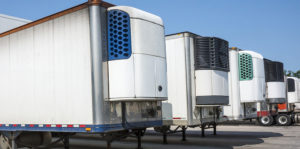How old is that trailer?
That’s a question that needs to be known before you load it with temperature sensitive pharmaceutical product. A reefer trailer’s capacity to thermally insulate the load from ambient extremes will naturally lessen over time. The capacity to insulate in called the overall heat transmission rate in Btu/hr-°F (UA). At the time of manufacture the values for each trailer are certified and posted at the time of manufacture following Recommended Practice #38 (Method for Heat Transmission of Refrigerated Vehicles) from the Truck Trailer Manufactures Association.
Most controlled temperature trailers on the road today are insulated with prefabricated panels that are comprised of a sprayed in place polyurethane core. Normal road stresses combine with the natural outgassing of the polyurethane panel core to contribute to an increase in UA (a reduction in R-value). To understand how outgassing happens, it is important to understand the structure of the foam form of polyurethane.
Polyurethane is a mixture of multiple component elements; the liquids are polyol, and isocyanate. These two liquids combine to form the polyurethane plastic. The foam form is accomplished by blowing bubbles into the plastic. The bubbles consist of two gases. One is R-22, which is expensive, and CO2, which is much less expensive. Over time, think years, CO2, the smaller molecule, migrates out of the foam. When CO2 migrates out, it is replaced by atmospheric air and water in vapor form; the result is degradation in the R-value of the panel.
What is R-value the degradation rate? It is generally accepted that this rate is about 5% per year. Over a five-year span, the trailer has a theoretical reduction of 25% from its original value. In order to account for this normal aging, the trailer manufacturer compensates by matching the trailer to a heating and cooling unit that has excess capacity. If, for example, the temperature control unit (TCU) is over-sized by 35%, the implication, in this example, is that you would want to be concerned about trailers over 7 years old. When operating under ambient extremes at the end of seven years, the TCU would be at its operational limit to maintain temperature.
How can the capabilities be determined? Make sure the trailers you use have a TMC certification plate so you can know the age of the trailer, and the excess cooling (heating) capacity. See the previous post on trailer classification.
For those of you who would like to learn more about polyurethane, I can recommend the Polyurethane Handbook by Gunter OertelISBN-10: 1569901570 | ISBN-13: 978-1569901571



